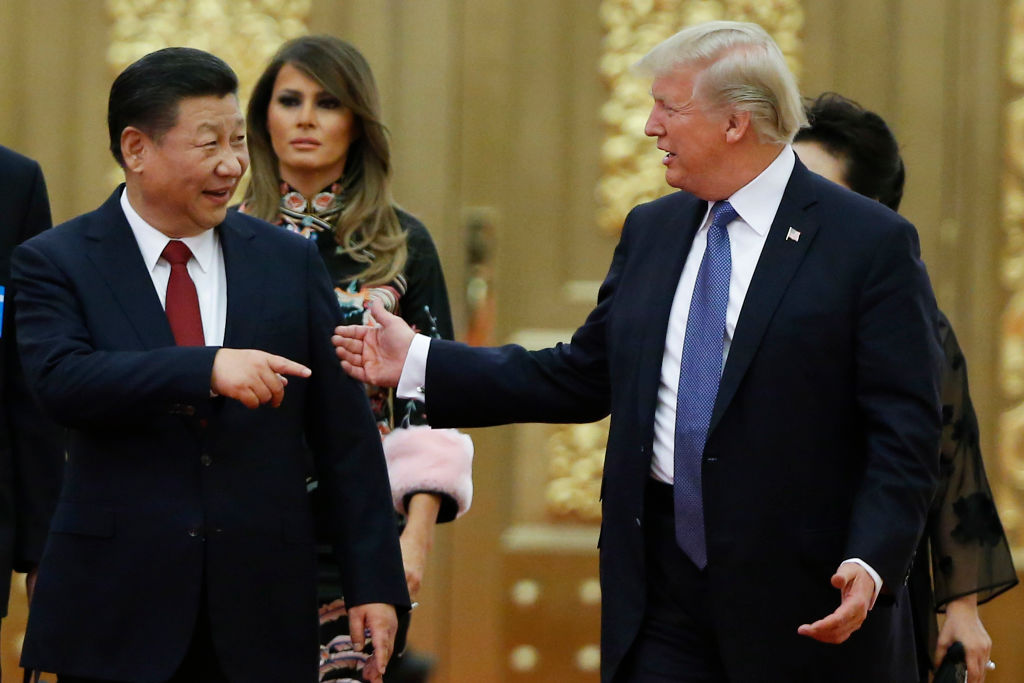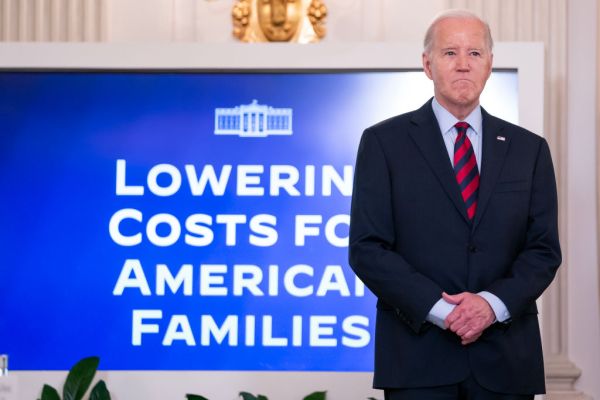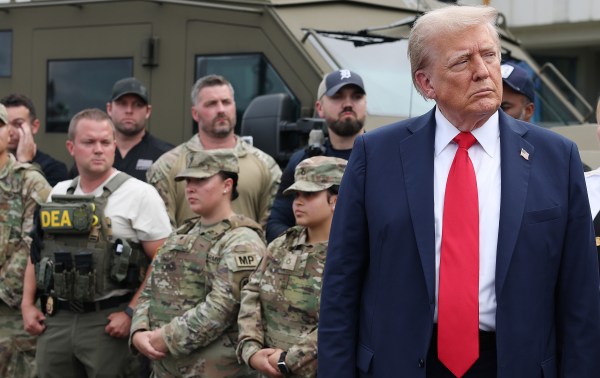If Donald Trump has a superpower, it is being so brazen and insistent in his stupidity and dishonesty that his lackeys, sycophants, and credulous marks have no choice but to adopt his stupidity and dishonesty as their own. This has happened to Sens. Ted Cruz and Marco Rubio, to the whole of Fox News, and to countless little old church ladies who want to explain to me how January 6 was a false-flag operation. As heuristics go, that’s a time-saving line in the sand: Either people actually believe it when they repeat Trump’s baloney, in which case they are too stupid for further conversation to be of any value, or they don’t believe it, in which case they are dishonest—and there’s never any point talking to a dishonest person.
Meet today’s contestant in “Stupid Or Dishonest?”—Republic National Committee spokeswoman Anna Kelly, who claimed: “The notion that tariffs are a tax on U.S. consumers is a lie pushed by outsourcers and the Chinese Communist Party.” As a specimen of Trumpist baloney, that is just about perfect: It is a lie, it is easily disproved, and it contains a preemptive strike accusing the people who are going to point out that it is a stupid, easily disproved lie of operating in bad faith.
Why this nonsense from the RNC right now?
Donald Trump has put forward the idiotic suggestion that we should replace the entire federal revenue system with tariffs, which would necessitate tripling the cost (very likely, more than tripling the cost) of imported goods—meaning gasoline, diesel, crude oil, pharmaceuticals, and other leading imports—and inflating the price of domestically produced alternatives to boot. That would mean, for example, that the $320 billion a year or so we spend on imported oil and gas ends up costing U.S. consumers nearly $1 trillion, and our $170 billion annual tab for imported pharmaceuticals would go to a little more than a half-trillion dollars.
It is an imbecilic idea, and there’s no particular reason to believe that Trump would seriously pursue it—given that he has rarely seriously pursued substantive policy ideas that would require persuading Congress to act. (You don’t have to work very hard to get a Republican Congress to pass tax cuts.) Recall that Trump accomplished precisely nothing on immigration when his party controlled both houses of Congress, and that’s one of the few issues on which he has been relatively active and ideologically consistent. But while Trump seethes when he sees an illegal immigrant who isn’t working at one of his hotels, tariffs are his great love, a blunt instrument he has admired dating back to the 1980s.
Who pays tariffs?
Despite what the RNC claims, tariffs are paid directly by U.S. firms and U.S. persons—they are a tax imposed on importers domiciled in the United States, not a tax imposed on foreign manufacturers. “Tax incidence”—the question of who really pays a tax in an economic sense—is a complicated thing in economics. The textbook example is the so-called employer’s share of the payroll tax, which, in most cases, seems to mainly be borne by employees in the form of lower wages. Sales taxes are, in theory, a tax on sellers and not a tax on consumers—but retailers and restaurants and such do you the favor of itemizing the expense on your receipts, lest there be any question of who really pays.
Americans import a lot of things that we don’t make here or can’t make here very efficiently, but we also import a lot of things that we do make here—gasoline, diesel, and natural gas among them. (There are lots of complicated logistical, economic, and even petrochemical reasons for that.) We also import a lot of manufactured goods, some of which directly compete with U.S.-made goods, though that gets complicated pretty quickly, too: A very large share of our imports are not finished goods at all but components and materials used by U.S. manufacturers, some of which end up in U.S. exports. Circle of economic life and all that.
One thing you can be sure about is that if you make a gallon of imported diesel three times more expensive (and the hypothetical tariff would have to be at least 200 percent to meet federal revenue needs, and possibly much more, since the tax surely would change consumer and firm behavior), a gallon of domestically produced diesel is going to get a lot more expensive, too. When you raise the price of competitors’ goods, domestic producers do not keep their own prices down out of the goodness of their hearts. We’ve seen this demonstrated approximately 100 million times. Trump’s steel tariffs, for example, preceded a 9 percent increase in steel prices that cost U.S. companies and consumers billions of dollars.
You could expect much (probably most) of the economic pain of such a tariff to fall on Americans. Trump’s own economic advisers, such as Larry Kudlow, will often admit as much when pressed—though many economists who know better have found it necessary to pretend to be stupid to keep Trump happy.
The United States has a very large market, but it is not the only possible destination for the world’s goods—only about 13 percent of the world’s exports are bound for the United States in a typical year, even though the U.S. share of world GDP is about twice that, more than 26 percent in 2023. If trade with U.S. buyers becomes economically untenable, those goods can be redirected elsewhere. And then Americans will be spared the indignity of being victimized by shadowy … Swiss people … who want to sell us … medicine. Or those nefarious Canadians who have tricked us into framing our houses with wood, which they have a lot of up there.
Dumb or dishonest? The answer for the RNC, apparently, is:
Yes.










Please note that we at The Dispatch hold ourselves, our work, and our commenters to a higher standard than other places on the internet. We welcome comments that foster genuine debate or discussion—including comments critical of us or our work—but responses that include ad hominem attacks on fellow Dispatch members or are intended to stoke fear and anger may be moderated.
With your membership, you only have the ability to comment on The Morning Dispatch articles. Consider upgrading to join the conversation everywhere.